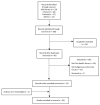One Health in Indigenous Communities: A Critical Review of the Evidence
- PMID: 34769820
- PMCID: PMC8583238
- DOI: 10.3390/ijerph182111303
One Health in Indigenous Communities: A Critical Review of the Evidence
Abstract
Indigenous populations around the world face disproportionately high rates of disease related to the environment and animals. One Health is a concept that has been used effectively to understand and address these health risks. One Health refers to the relationships and interdependencies between animal, human, and environmental health and is an emerging research field that aligns with indigenous views of health. To understand the applicability of One Health in indigenous communities, a critical review was undertaken to investigate evidence of One Health research in indigenous communities internationally, assess the strength of evidence, and understand what gaps are present. This review included the appraisal of twenty-four studies based in five regions: Canada, Africa, Australia, South America, and Central America. The review found that there is a need for studies of high strength, with rigorous methods, local leadership, and active involvement of indigenous viewpoints, to be undertaken in indigenous communities internationally that focus on One Health. It highlights the need to further consider indigenous viewpoints in research to reduce limitations, increase effectiveness of findings, consider appropriateness of recommendations, and benefit communities.
Keywords: One Health; animal health; environmental health; holistic; indigenous health; transdisciplinary.
Conflict of interest statement
The authors declare no conflict of interest.
Figures
References
-
- Dudgeon P., Milroy H., Walker R. Working Together: Aboriginal and Torres Strait Islander Mental Health and Wellbeing Principles and Practice. Commonwealth of Australia; Canberra, Australia: 2014.
-
- World Health Organization . Health Promotion Glossary. World Health Organization; Geneva, Switzerland: 1998.
-
- Lerner H. The philosophical roots of the “One Medicine” movement: An analysis of some relevant ideas by Rudolf Virchow and Calvin Schwabe with their modern implications. J. Studia Philos. Est. 2013;6:97–109. doi: 10.12697/spe.2013.6.2.07. - DOI
Publication types
MeSH terms
LinkOut - more resources
Full Text Sources



